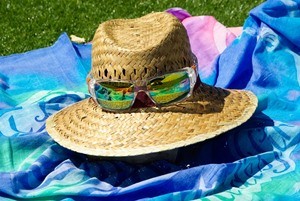Spring is coming and so is summer for other countries. I’m sure that a lot of people are already thinking and planning about traveling. It’s really fun and exciting but certain health concerns should also be considered and be given attention. One of these is keeping your eyes protected from harsh weather, sun exposure and other factors.
Here are a few ways to protect your eyes during travel:
Wear Protective Eyewear
Extended exposure to the sun’s UV rays can lead to certain eye problems such as cataracts, macular degeneration, macular degeneration,pingueculae, pterygia and photokeratitis that can cause temporary vision loss. Aside from UV rays, your eyes are also exposed to dust, dirt and pollen while traveling. So always wear protective eyewear and make sure that it blocks at least 99% of the UV rays.
Sunglasses aren’t’ simply a fashion accessory but a very helpful tool to protect your eyes. Keep in mind that your sunnies don’t need to be expensive; as long as it does the job, you’re good to go.
Pack Eye Drops
Traveling to a place with extremely hot/cold wind and long airplane rides can make your eyes really dry and easily irritated. So to avoid discomfort during you vacation, make sure to that you have eye drops packed in your bag even if you don’t suffer from Dry Eye Syndrome or any existing eye problems.
Drink Plenty of Water
Of course, an eye drop is already a remedy for dry eyes but you can help yourself to avoid having such by keeping your body hydrated. Drink at least 8 glasses of water per day to make sure your eyes are properly hydrated.
Bring Your Prescription
If by chance you break your glasses or lose your contacts, having your prescription with you won’t leave you not being able to enjoy sightseeing during your vacation. What’s good about traveling if you can’t even see your surroundings properly?
Continue Caring for Your Contact Lenses
When packing for your trip, be sure to pack enough replacements and back up pair of glasses. You may be busy during your vacation and end up really tired during the evening but remember your contacts wear cycle, when to replace your solution and of course, to take it off before going swimming, bathing and sleeping (if you don’t use extended wear contact lenses).










